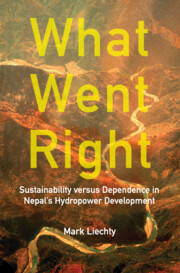Book contents
- Frontmatter
- Dedication
- Contents
- Preface
- Acknowledgments
- List of Abbreviations
- 1 A Corporate Vision: Business as Development Philosophy
- 2 The Butwal Technical Institute, Tinau, and the Origins of the Butwal Power Company
- 3 Andhi Khola
- 4 Jhimruk
- 5 The “Great Upheaval”: Khimti and the Limits of the Hoftun Hydropower Vision
- 6 Melamchi and the Rush to Privatization
- 7 Privatization: The Long Haul
- 8 The New BPC: Cultures in Conflict
- 9 Conclusion: From Seed, to Plant, to Seed
- Bibliography
- Index
- Miscellaneous Endmatter
8 - The New BPC: Cultures in Conflict
Published online by Cambridge University Press: 23 April 2022
- Frontmatter
- Dedication
- Contents
- Preface
- Acknowledgments
- List of Abbreviations
- 1 A Corporate Vision: Business as Development Philosophy
- 2 The Butwal Technical Institute, Tinau, and the Origins of the Butwal Power Company
- 3 Andhi Khola
- 4 Jhimruk
- 5 The “Great Upheaval”: Khimti and the Limits of the Hoftun Hydropower Vision
- 6 Melamchi and the Rush to Privatization
- 7 Privatization: The Long Haul
- 8 The New BPC: Cultures in Conflict
- 9 Conclusion: From Seed, to Plant, to Seed
- Bibliography
- Index
- Miscellaneous Endmatter
Summary
In 2003 the now privatized Butwal Power Company (BPC) set out to retain and expand its leading role in hydel development in Nepal. The company's new joint owners—the Nepali majority investors who made up the Shangri-La Energy Limited (SEL) group and the minority Norwegian investors of Interkraft Nepal (IKN)—were eager to make up for lost time and institute their visions for the new company. Unfortunately, these visions were often not eye to eye. Whereas Odd Hoftun and a number of Nepali professional staff with ties to the old BPC sought to re-establish the company's earlier ethic of corporate reinvestment and national capacity building, the new Nepali majority owners were businesspeople intent on generating profits—not least in order to service debts incurred in buying BPC. Whose vision would prevail became a matter of pointed struggle as IKN tried to assert its rights to management control (legally provisioned in BPC's sales and purchase, and consortium agreements) while the SEL investors claimed their rights (and interests) as majority investors. The structural power fault lines already under strain during the privatization process only increased their friction as the two sides repeatedly rubbed against each other before finally splitting and drifting apart. Over the following decade the collateral damage included a chronically underperforming BPC that saw its leading status ebb away as new independent power producers entered the market, and an increasingly dispirited Hoftun who watched the gradual demise of the development philosophy that had motivated his involvement in BPC for most of his life.
POST-PRIVATIZATION: THE EARLY YEARS
According to the management agreement arrived at earlier between IKN, SEL, and Agder Energi (the Norwegian power company that was to play an advisory role in the now privatized BPC), Agder Energi would make available a “full time expatriate expert to fill the position of BPC General Manager.” This person was expected to train and eventually hand over the position to a Nepali counterpart. The same agreement gave IKN the right to choose a Nepali national for the deputy general manager position with both manager and deputy formally appointed by the BPC board. For years Odd Hoftun had hoped that Balaram Pradhan would accept the general manager post but when he declined, IKN turned to the team of Egil Hagen and Suman Basnet.
- Type
- Chapter
- Information
- What Went RightSustainability Versus Dependence in Nepal's Hydropower Development, pp. 230 - 269Publisher: Cambridge University PressPrint publication year: 2022



